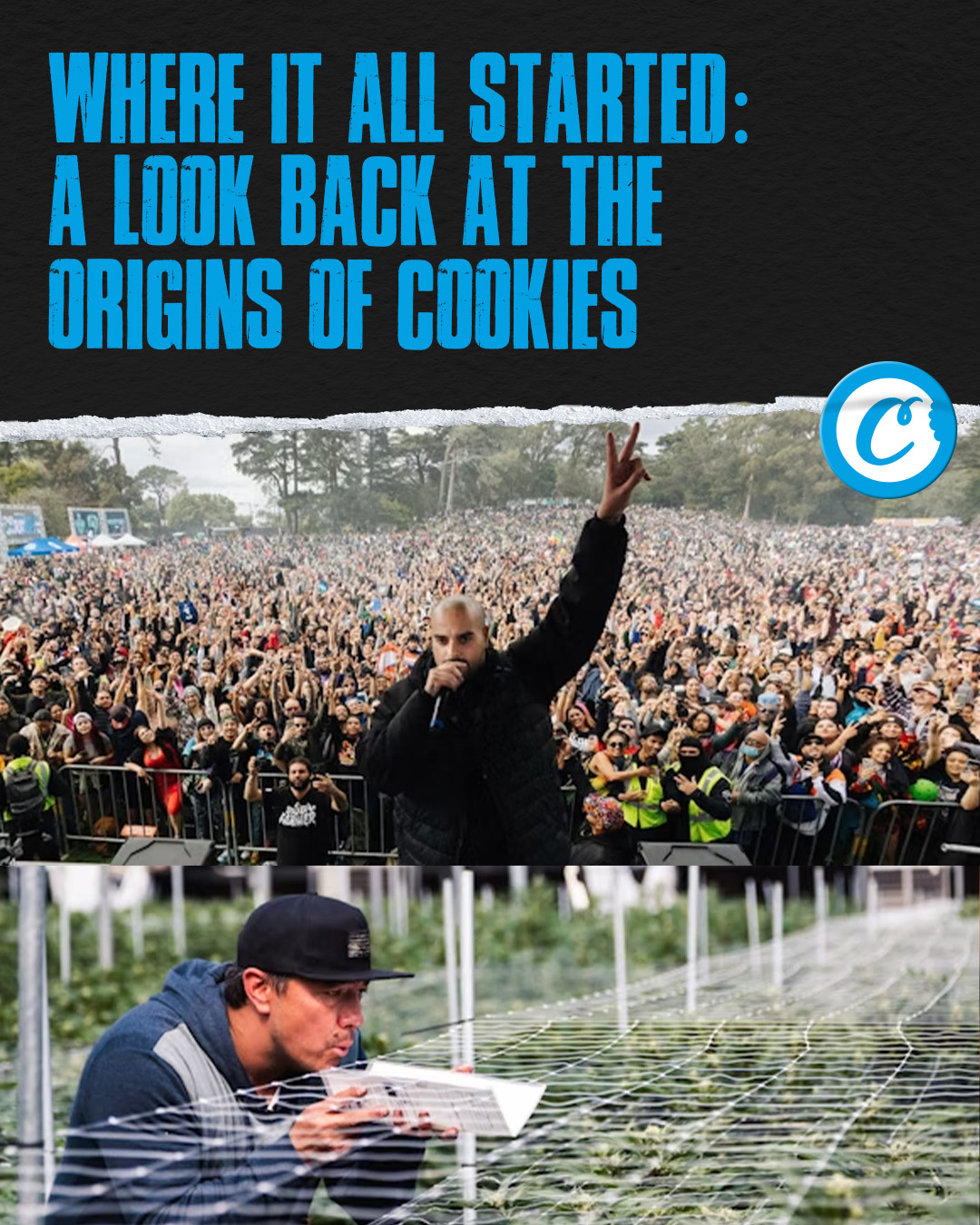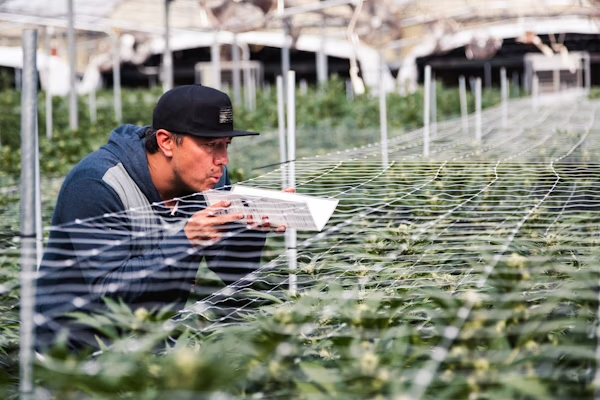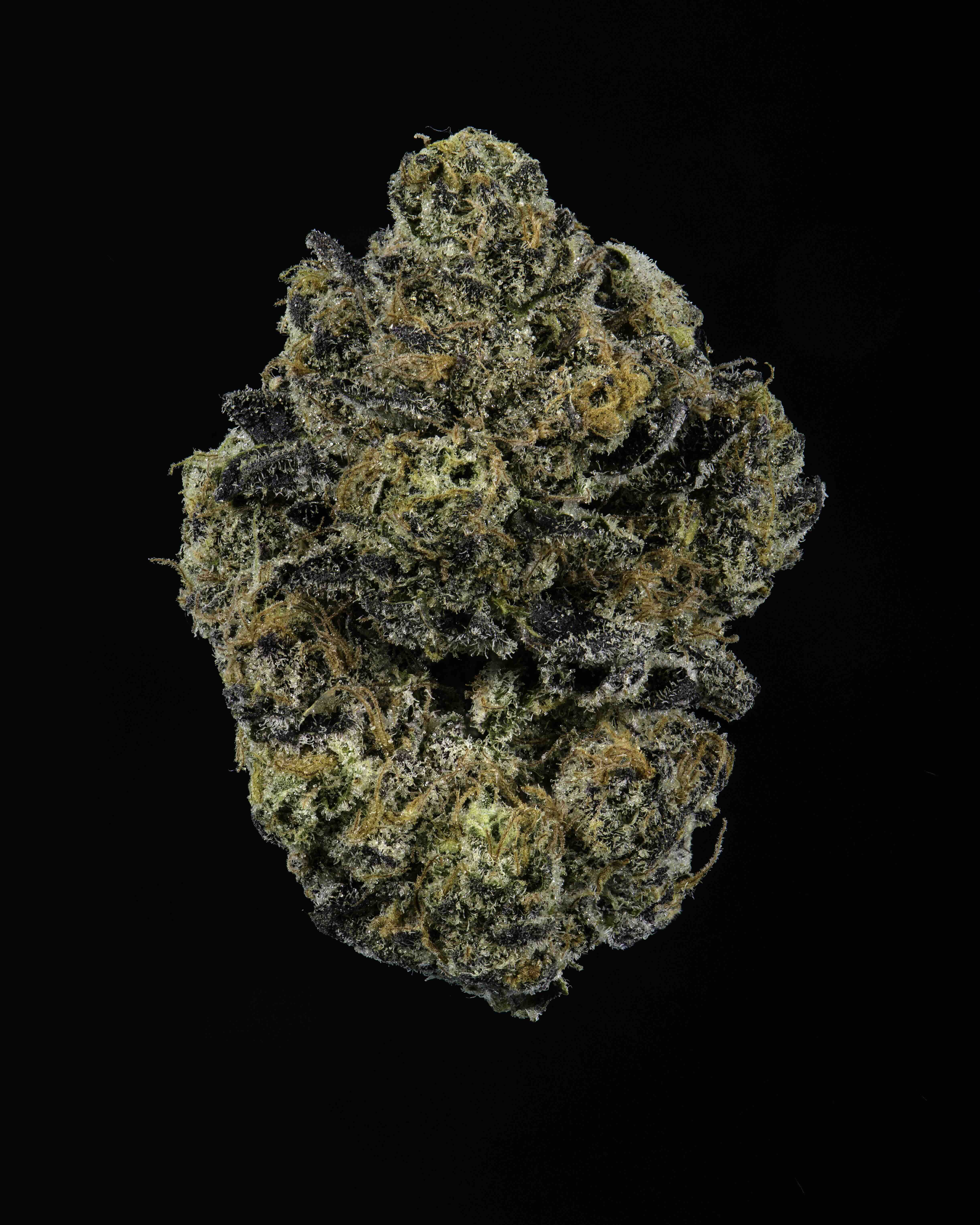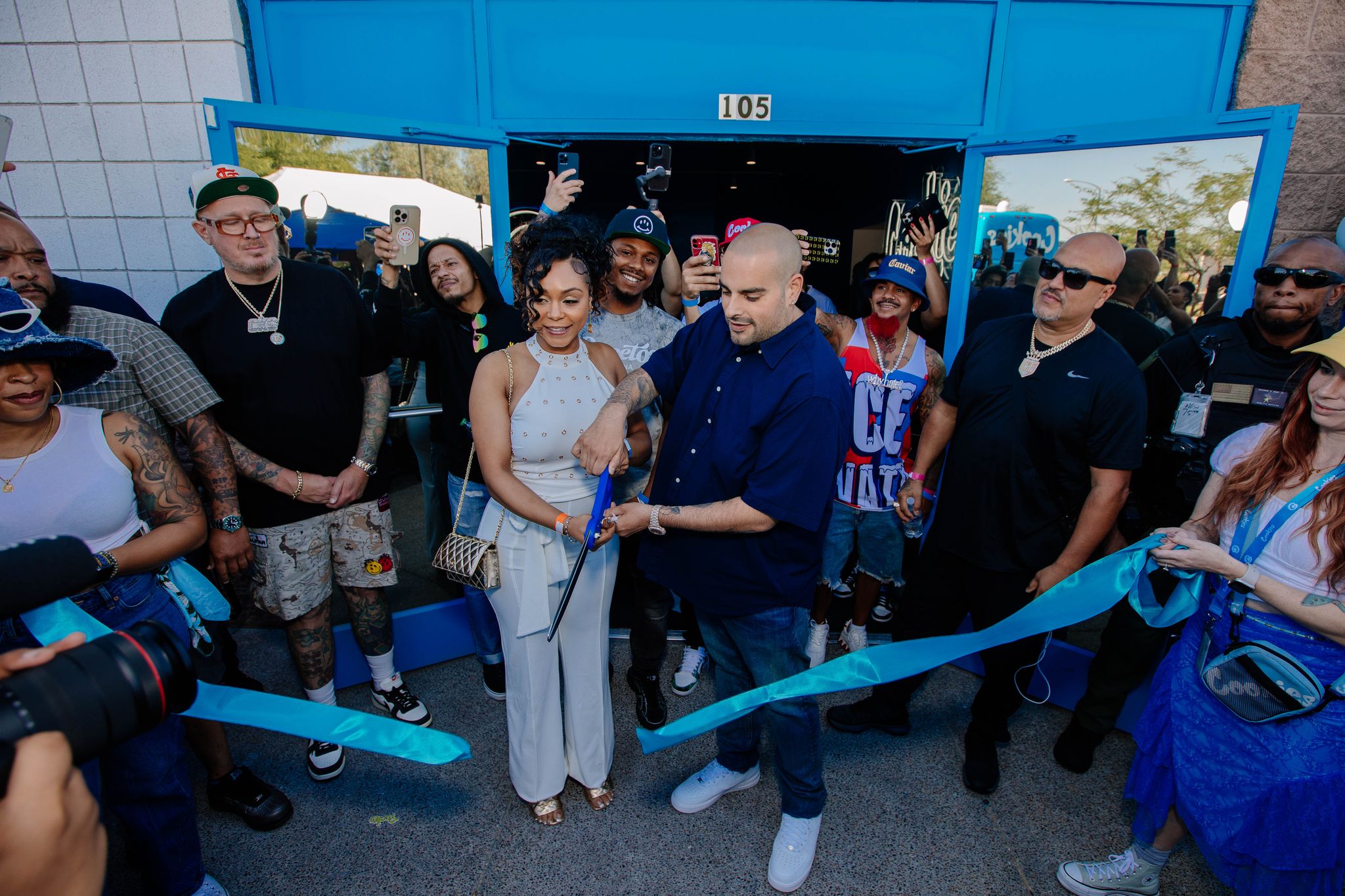Where It All Started: A Look Back at the Origins of Cookies
 In the contemporary cannabis landscape, few names resonate with the same frequency and cultural weight as Cookies. What began as a specific strain and a grassroots movement has blossomed into a globally recognized lifestyle brand, synonymous with premium genetics, authentic culture, and entrepreneurial vision. But behind the ubiquitous blue branding and the international network of medical and recreational dispensaries lies a story rooted in San Francisco's unique cannabis culture, driven by the powerful intersection of music and weed. This is a look back at where it all started – the origins of Cookies.
In the contemporary cannabis landscape, few names resonate with the same frequency and cultural weight as Cookies. What began as a specific strain and a grassroots movement has blossomed into a globally recognized lifestyle brand, synonymous with premium genetics, authentic culture, and entrepreneurial vision. But behind the ubiquitous blue branding and the international network of medical and recreational dispensaries lies a story rooted in San Francisco's unique cannabis culture, driven by the powerful intersection of music and weed. This is a look back at where it all started – the origins of Cookies.
Where the Movement Took Root: San Francisco Medical Days
The story of Cookies is inextricably linked to the journey of its co-founder, Gilbert Miliam Jr., better known as Berner. Long before Cookies became a household name, Berner was cultivating a creative spirit, finding an outlet in hip-hop from a young age and starting to rap during his high school years. His appreciation for music and pop culture would later prove instrumental in shaping the brand's identity.
Berner's relationship with THC began early, but his true passion ignited in the Bay Area after experiencing a high-quality strain that he described as "life-changing". By the age of 18, taking advantage of San Francisco's early adoption of medical marijuana, Berner secured one of the first medical cards. He became a regular at a local dispensary, immersing himself in the legal cannabis scene while maintaining connections within the established underground market.
Driven by his burgeoning interest, Berner even filmed a documentary about marijuana in the Bay Area. It was during this project, while filming at a local dispensary, that he was offered a job. Starting as an intake representative and eventually becoming a budtender, Berner gained invaluable firsthand experience. This position was far more than just employment; it served as a real-time market research laboratory. Day after day, Berner interacted with consumers, observed purchasing patterns, and noticed a significant market gap. Vendors would deliver large quantities of cannabis, often in simple bags with just a strain name, lacking any distinct branding or sophisticated presentation. Berner took pride in jarring the flower and creating appealing signs, recognizing that presentation influenced customer choice. This ground-level perspective revealed a clear opportunity: the THC space was ripe for strong, identifiable branding.
Cultivating Partnerships:
 While working as a budtender, Berner developed a deep appreciation for the work of a specific Bay Area cultivator known only as Jai. Berner particularly admired Jai's Cherry Kush strain for its exceptional quality. In a move that foreshadowed his future branding prowess, Berner decided to show his appreciation for Jai's craft. He produced T-shirts featuring the "Cherry Kush" name and prominently featured one in his first music video. This act, born from genuine admiration and a desire to share quality, served as an unintentional, yet pivotal, first step towards branding. It demonstrated an early understanding that the product itself – the unique genetics – was worth celebrating and promoting.
While working as a budtender, Berner developed a deep appreciation for the work of a specific Bay Area cultivator known only as Jai. Berner particularly admired Jai's Cherry Kush strain for its exceptional quality. In a move that foreshadowed his future branding prowess, Berner decided to show his appreciation for Jai's craft. He produced T-shirts featuring the "Cherry Kush" name and prominently featured one in his first music video. This act, born from genuine admiration and a desire to share quality, served as an unintentional, yet pivotal, first step towards branding. It demonstrated an early understanding that the product itself – the unique genetics – was worth celebrating and promoting.
This mutual respect and shared passion for quality cannabis laid the groundwork for a formal partnership. In 2010, Berner and Jai officially founded Cookies, uniting Berner's cultural savvy and market insights with Jai's cultivation expertise. From its inception, the collaboration underscored a fundamental principle: the brand would be built upon a foundation of superior, distinctive cannabis genetics. This focus on the product's intrinsic quality was not merely a feature but the cornerstone upon which the entire Cookies edifice would be constructed, later formally articulated in the company's mission to create "game-changing genetics".
Fashion as Legal Armor:
As the concept of Cookies began to take shape, Berner encountered a significant hurdle inherent to the cannabis industry of the time: the inability to secure federal trademarks for weed brands due to the plant's ongoing federal prohibition. This presented a major obstacle to building and protecting a unique brand identity in a market susceptible to imitation. Berner's solution was both pragmatic and ingenious. Recognizing that while cannabis itself couldn't be trademarked, clothing and apparel could be, he made a strategic pivot.
The team launched Cookies SF, a distinct streetwear line. This move was far more than simple merchandising; it was a crucial, legally astute maneuver designed to establish ownership and visibility for the "Cookies" name and its associated branding elements.1 By trademarking the clothing line, Berner could legally protect the brand's identity and build equity around the name and logo, creating a tangible presence in recreational dispensaries and the broader culture even before the cannabis products themselves could carry the same formal protection. The apparel line quickly gained traction, allowing the brand to establish a visual foothold and generate revenue, demonstrating the power of this strategic workaround.
The Strain That Ignited the Hype:
 While Cherry Kush marked an early point of inspiration, it was another strain that truly catapulted the Cookies name into the cannabis lexicon: G.S.C. This iconic strain, reportedly a cross between OG Kush and a unique Durban Poison cut, quickly gained notoriety for its potent effects and distinct, desirable flavor profile. G.S.C embodied the brand's commitment to premium genetics and became a cornerstone product, validating the focus on quality that Berner and Jai championed.
While Cherry Kush marked an early point of inspiration, it was another strain that truly catapulted the Cookies name into the cannabis lexicon: G.S.C. This iconic strain, reportedly a cross between OG Kush and a unique Durban Poison cut, quickly gained notoriety for its potent effects and distinct, desirable flavor profile. G.S.C embodied the brand's commitment to premium genetics and became a cornerstone product, validating the focus on quality that Berner and Jai championed.
The strain's reputation spread rapidly, but its ascent was significantly accelerated by a key encounter around 2011. Hip-hop superstar Wiz Khalifa tried G.S.C, was immediately impressed, and became an early and vocal advocate for the strain and the burgeoning brand. This endorsement was not merely celebrity backing; it stemmed from a genuine appreciation for the product's quality. Khalifa began referencing Cookies through his extensive media channels, providing invaluable exposure. This sequence of events highlights a critical dynamic: the investment in developing unique, high-quality genetics yielded a product so compelling that it organically attracted high-profile, authentic advocacy, which, in turn, became a powerful engine for brand awareness.
Cookies’ Cultural Breakthrough:
Berner's unique position straddling the worlds of marijuana and hip-hop music proved to be a decisive advantage. As his own music career gained traction, fostered by connections with established figures like Wiz Khalifa (who eventually signed Berner to his Taylor Gang label), Berner gained access to a massive, culturally relevant platform. He astutely recognized the potential to leverage this platform for brand building in an industry where traditional advertising avenues were largely unavailable.
Berner consciously integrated Cookies branding into his music-related activities. A prime example occurred when he wore a Cookies sweatshirt in the music video for "Yoko," a track featuring Chris Brown, Wiz Khalifa, and Big K.R.I.T.. This strategic product placement exposed the brand to millions of viewers within a context that felt organic and authentic. It wasn't just advertising; it was cultural integration. By weaving Cookies into the fabric of hip-hop culture through his music and associations, Berner bypassed conventional marketing limitations and built brand awareness through genuine cultural resonance. This synergy, combined with the power of social media and the undeniable appeal of the strains of weed themselves, allowed Cookies to cultivate a strong grassroots following while simultaneously gaining mainstream momentum.
From Underground Roots to Legal Empire:
Following the success of the apparel line and the cultural buzz generated by G.S.C and music industry ties, the Cookies THC brand officially launched in 2012. This marked a transition from the more informal promotion of specific strains of weed and apparel to the establishment of a formal cannabis entity. As cannabis legalization began to sweep across the United States, Cookies navigated the complex shift from its origins in the medical and underground markets to the burgeoning legal recreational dispensary landscape.
A major milestone in this evolution was the opening of the first official Cookies retail store in Los Angeles in 2018. This move signaled a new era of direct-to-consumer engagement and brand control. The success of the LA flagship paved the way for rapid expansion. Today, the Cookies retail footprint extends to over 70 locations across multiple US states and internationally, significantly increasing brand accessibility and solidifying its market presence.
Parallel to retail expansion, Cookies diversified its product offerings well beyond flower. The brand now encompasses pre-rolls, vapes, concentrates, edibles, CBD products, and even ventures into functional mushrooms, catering to a wider spectrum of consumer preferences. Strategic partnerships have also been key to this growth, including international expansion, such as the partnership with Mamedica to enter the medical marijuana market in the UK. This demonstrates a remarkable capacity for adaptation and strategic scalability, transforming Cookies from a culturally-driven phenomenon into a sophisticated, multinational cannabis company capable of navigating the complexities of global legalization while striving to maintain its core identity.
 The Anatomy of Cookies' Success:
The Anatomy of Cookies' Success:
The immense hype and enduring market dominance of the Cookies brand are not accidental. They are the result of a confluence of carefully cultivated factors:
- Premium Genetics: At its core, the brand's reputation was built on the tangible quality and unique characteristics of its strains, starting with cultivator Jai's work and exemplified by the impact of G.S.C.
- Berner's Vision & Hustle: Co-founder Berner brought not only a passion for cannabis but also exceptional entrepreneurial drive, marketing savvy, and an innate ability to connect culture with commerce. His understanding of branding and market dynamics was crucial from the outset.
- Music Industry Synergy: The authentic integration with the hip-hop world, particularly through Berner's own career and his association with artists like Wiz Khalifa, provided unparalleled marketing reach and cultural validation.
- Strategic Branding: The clever use of apparel (Cookies SF) to circumvent trademarking limitations and build brand identity early on was a masterstroke of strategic thinking.
- Cultural Resonance: Cookies didn't just sell cannabis; it tapped into and helped shape cannabis culture, building a loyal community around shared values of authenticity and quality.
- Accessibility & Expansion: The strategic move into branded retail and subsequent global expansion, coupled with product diversification, made the brand widely accessible and catered to evolving consumer demands.
The Cookies Standard: A Commitment to Game-Changing Genetics
Throughout its evolution, from dispensary observations to global enterprise, a consistent thread has defined the Cookies brand: a commitment to the plant itself. The company's official mission, "to create game-changing genetics", is more than just a slogan. It reflects the origins of the brand – Berner's admiration for Jai's cultivation skill, the impact of standout cannabis strains like Cherry Kush and G.S.C, and the fundamental belief that quality and innovation in cannabis genetics are paramount. This mission serves as the enduring core of the brand's identity and its promise to consumers: delivering unique, high-quality THC experiences rooted in authenticity and genetic excellence.
 The Enduring Blueprint of Cookies:
The Enduring Blueprint of Cookies:
The story of Cookies is a compelling narrative of modern brand building, demonstrating how authenticity, strategic innovation, and cultural integration can create a global phenomenon. It began not in a boardroom, but in the heart of the Bay Area cannabis scene, driven by a budtender's keen eye, a cultivator's skill, and the unifying power of music. Berner and Jai identified a need for branding and quality assurance, leveraging apparel to build identity when legal constraints blocked traditional paths. They cultivated genetics that captured the attention of cultural influencers, organically amplifying their message. As the legal landscape shifted, Cookies adapted, scaling our operations through retail expansion and diversification while staying true to its roots.
Cookies' journey offers a powerful blueprint for success in the modern cannabis industry and beyond. It underscores the importance of product quality as the foundation, the necessity of agile and creative branding strategies, and the profound impact of embedding a brand within the cultural currents that shape consumer identity. From a simple T-shirt celebrating a quality strain to a multinational company, Cookies has proven that a brand built on authenticity, innovation, and a deep understanding of its community can indeed change the game.